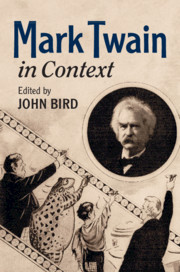Book contents
- Mark Twain in Context
- Mark Twain in Context
- Copyright page
- Contents
- Figures
- Contributors
- Preface
- Acknowledgments
- Chronology
- Abbreviations
- Part I Life
- Part II Literary Contexts
- Chapter 5 Southwestern Humor
- Chapter 6 Literary Comedians
- Chapter 7 Local Color and Regionalism
- Chapter 8 Early Periodical Writing
- Chapter 9 Travel Writing
- Chapter 10 Short Fiction
- Chapter 11 Publishing
- Chapter 12 Lectures and Speeches
- Chapter 13 Contemporary Writers
- Chapter 14 Realism and Naturalism
- Part III Historical and Cultural Contexts
- Part IV Reception and Criticism
- Part V Historical, Creative, and Cultural Legacies
- Further Reading
- Index
- References
Chapter 9 - Travel Writing
from Part II - Literary Contexts
Published online by Cambridge University Press: 12 December 2019
- Mark Twain in Context
- Mark Twain in Context
- Copyright page
- Contents
- Figures
- Contributors
- Preface
- Acknowledgments
- Chronology
- Abbreviations
- Part I Life
- Part II Literary Contexts
- Chapter 5 Southwestern Humor
- Chapter 6 Literary Comedians
- Chapter 7 Local Color and Regionalism
- Chapter 8 Early Periodical Writing
- Chapter 9 Travel Writing
- Chapter 10 Short Fiction
- Chapter 11 Publishing
- Chapter 12 Lectures and Speeches
- Chapter 13 Contemporary Writers
- Chapter 14 Realism and Naturalism
- Part III Historical and Cultural Contexts
- Part IV Reception and Criticism
- Part V Historical, Creative, and Cultural Legacies
- Further Reading
- Index
- References
Summary
Mark Twain’s first nationally successful book was The Innocents Abroad, a travel book that recounted his 1867 trip to Europe and the Holy Land, a huge best seller that made satiric comment on both the Old World and America, a combination of humor and straight description. Twain drew on the emerging tradition of American travel writing, often skewering the tradition and the form, but also helping its further development. Travel writing runs throughout Twain’s career, including Roughing It, A Tramp Abroad, Life on the Mississippi, and Following the Equator. In his time, Twain was more often considered and celebrated as a travel writer than a writer of fiction.
Keywords
- Type
- Chapter
- Information
- Mark Twain in Context , pp. 91 - 99Publisher: Cambridge University PressPrint publication year: 2020

